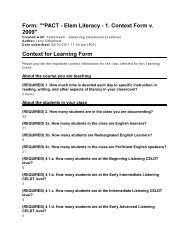The Tutoring Book - California State University, Sacramento
The Tutoring Book - California State University, Sacramento
The Tutoring Book - California State University, Sacramento
You also want an ePaper? Increase the reach of your titles
YUMPU automatically turns print PDFs into web optimized ePapers that Google loves.
they are unaware of the social implications attached to them. Thus begins the struggle for a new identity<br />
somewhere in between, one that will be accepted by both communities of speakers.<br />
<strong>The</strong> academy’s expectations of SAE production in college composition papers necessitate an<br />
aggressive growth of SAE in the writing of speakers of AAVE in order for the demographic to attain social and<br />
vertical mobility. Nonetheless, adherence to expectations and standards by this disadvantaged population is not<br />
necessarily the primary concern. As tutors, we are educators, and as educators, we have a responsibility to avoid<br />
stifling the African American voice while attempting to instill appropriate SAE writing features for their success<br />
in academic work and business. By stifling their style completely, we run the risk of causing more damage than<br />
just dry, formulaic, unoriginal term papers; we run the risk of destroying their social and cultural identities. <strong>The</strong><br />
academy values a sophisticated use of voice, but this is a sophistication which speakers of AAVE, as novice<br />
writers, lack. Cooks explains that students “must learn not to think of writing in a hierarchical structure but rather<br />
to think of all types of writing as being equally valid” (2004, p. 76). Roozen reminds us to consider “how<br />
important it is in human terms to look at the whole person, to support the extracurricular activities as well as the<br />
curricular” (2008, p. 30). Throughout my experiences working with speakers of AAVE, I have noticed a strong<br />
resistance to this hierarchical structure, especially with students new to an academic community, but the<br />
institution has built that structure and has maintained it. <strong>The</strong>se writers are not the only ones who need to stop<br />
thinking of writing as a hierarchical structure. We all do. Perhaps this breakdown begins with the tutor. We have<br />
the power to be sensitive and encouraging, of bringing awareness to the African American student of the<br />
significance of having a strong control over both dialects. Educators have a responsibility to provide more for<br />
students than standard methods. As composition tutors, we encourage students to develop their own ideas and<br />
arguments by supporting them with evidence and analysis. We explain that we value their opinions, that we are<br />
interested in what makes them unique and progressive thinkers. However, we need to listen because listening is a<br />
fundamental signal that we truly value what they have to say.<br />
Getting off the soap box, there are definitely practical approaches to working with the writing of<br />
speakers of AAVE. One of the best places to begin is just knowing which features are common (and sometimes<br />
even unique) in their writing. Like code switching, you may recognize some of these features as ‘errors’ you<br />
might find in an ESL writer’s paper. It should come as small surprise, then, that often the best way to approach<br />
these features in an AAVE speaker/writer’s paper is with more direct and explicit feedback as we would an ESL<br />
paper.<br />
� <strong>The</strong>y will rarely omit a plural –s if it is pronounced /z/<br />
<strong>The</strong> boys and girls bought stamp to mail letters to their three cat.<br />
� Possessive –s in noun possessive construction is often omitted<br />
<strong>The</strong> lady purse is pink.<br />
� Regular plural endings omitted<br />
I’m takin five class this semester.<br />
� 3 rd person singular –s is almost always omitted<br />
Everyone drive to work at the same time.<br />
� Dropped –ed past-tense marker<br />
We park the car too far away, yesterday.<br />
� <strong>The</strong>re is often an absence of inflected “is” and “are”<br />
She ( ) mad cuz we ( ) fly.<br />
115

















